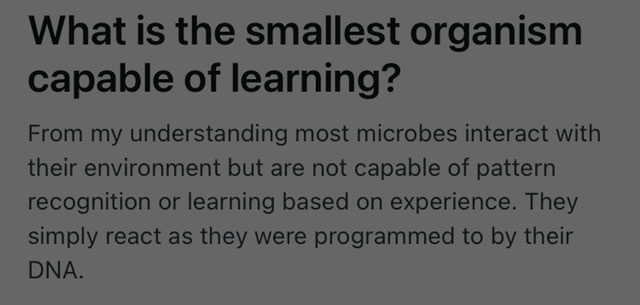Cording decoding as above or through earliest forms of instinctual learning……
Mcoding , acquisition, uncoding-learning to innovate, as basis of further acquisition; leading to utilization- tools, decode
Cording decoding as above or through earliest forms of instinctual learning……
Mcoding , acquisition, uncoding-learning to innovate, as basis of further acquisition; leading to utilization- tools, decode
Tha language of the bark
programmed language … but some dogs can learn new tricks.
but what about those who can’t?
and who programmed the unlearned stuff?

Yes again a double coiled matter.
[Deoxyribonucleic acid (/diːˈɒksɪˌraɪboʊnjuːˌkliːɪk, -ˌkleɪ-/ (listen);[1] DNA) is a polymer composed of two polynucleotide chains that coil around each other to form a double helix. The polymer carries genetic instructions for the development, functioning, growth and reproduction of all known organisms and many viruses. DNA and ribonucleic acid (RNA) are nucleic acids. Alongside proteins, lipids and complex carbohydrates (polysaccharides), nucleic acids are one of the four major types of macromolecules that are essential for all known forms of life.]
However that’s not we were looking for, and to the present time, the epistemological/ideal separation persists to this day.
The ego as personality means nil, in a clean slate tableau, where the WORD was in the beginning.
So the dna replication does not enter the Other determinate of the origin of the language of logic its use for investigating epistemological phenom or cogent structure, whereby recognition of patterns can be attributed.
It is, again a sync, a douplex, as a snake searches for it’s own head to swallow.
This symbol is also a double dealt idea, the self destruction and the rebirth, may be configured as patently restructure or, a latent renewal, irrespective of content.
The question does not appear to resolve, unless treated functionally, triangulated by a model formed of some map, rather then reducing the other geometric pattern into the linearity of weightless configurations.?
Ego = Be/Concept/Understanding
Superego = Do/Idea/Reason
Id = End/Intuition/Judgment
You need all three (whole) to even fully have one. If you fully have one, you have all three (whole).
A privation chain reacts to the rest, but is subsumed / contained in the Original (Trinity).
And how does that relate to dogs?
I could answer that, but in my throat there are frogs.
Are you sure you are not horse??
I am sure that, though indelibly unrefined, I ran like Forrest on the race course.
Backwards.
There again!
_
![]()
[youtube]https://www.youtube.com/watch?v=Utym4E-Ko4w[/youtube]
[youtube]https://www.youtube.com/watch?v=mXU2t-3kDRM[/youtube]
I’ve always thought that this thread was pretty vague and diffuse, especially considering the complete lack of clarity on the matter of how you would define “phenomenal thinking”; absent from the thread.
Just for fun I asked ChatGPT for it’s view… Here’s what I got.
Phenomenal thinking typically refers to a way of perceiving or understanding things that emphasizes the subjective experience or qualities of phenomena. It involves an individual’s conscious experience of the world, including their perceptions, sensations, feelings, and consciousness itself.
In philosophy, phenomenal thinking is often associated with phenomenology, a branch of philosophy that focuses on the study of consciousness and the structures of experience. Phenomenology explores how things appear to us in our conscious experience and seeks to describe the pure nature of these experiences without making assumptions about the existence of external objects.
Phenomenal thinking can also refer to the process of being deeply aware and engaged with one’s immediate experiences, being attuned to the richness and subtleties of sensory perceptions, emotions, and thoughts in the present moment.
Overall, phenomenal thinking involves examining and understanding the subjective nature of our conscious experiences and how these experiences shape our understanding of the world.
Since this is so clearly linked with phenomenology I would have to conclude that no dog thinks this way.
Not only would you have to be aware of the object/subject distinction; and have an awareness of the meaning of “phenomenon”, I think the definition would include the ability to articulate such an awareness.
So, whilst dogs are amazing and special and surprising in many ways; phenomenal thinkers they are not.
It actually does not include the ability to articulate anything. And dogs can articulate a lot. Our language ways of communicating are shortcuts. We mathematize our emotions (not to be confused with feelings-free-of-interpretation), so to speak. They (dogs… and… folks who don’t/can’t fall back on words…) cut out the middleman.
Did you read my past post?
What then is your definition of Phenomenal Thinking?
It is sitting (even if doing other stuff) with the point of all being, doing, purposing—rather than pointing to it or sitting with what points to/away.
If I was forced to put it in words.
It’s living the point. Or. More like. The point living through/with you (“with your consent” is implied).
Not in the slightest bit convincing or really meaningful as it is full of undefined terms.
I’d go so far as to call it word salad.
You prolly eat Webster’s word salad for breakfast.
What’s your excuse.
Do YOU even know what you meant?
presupposing the capability to self=other each other
& making everything we do pivot that
basically
![]()